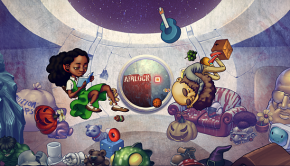I Gatcha Babe: Monetization and Puzzle & Dragons
GungHo Online Entertainment is the current darling of the mobile game industry. Their smash hit Puzzle & Dragons has more than 16 million users in Japan, and just surpassed 1 million in South Korea. The game is generating over $100 million in revenue per month, and in May, its market capitalization exceeded industry stalwart Nintendo. Whether GungHo is the next big Japanese game developer or just a flash in the pan remains to be seen, but one thing is certain: they are making a lot of money, and everyone wants to know how. Unfortunately, Western analyses of Puzzle & Dragon’s success tend to focus on the small subset of monetization techniques common to Western games, glossing over or misrepresenting the more interesting ways Puzzle & Dragons has achieved its success. The secret “special sauce” is not in GungHo’s psychological prowess or monetization techniques, but in the game they have constructed around it. GungHo’s Puzzle & Dragons is Balanced and Fair, Constantly Changing, and Surprisingly Generous. As a result, they have created an environment where players enjoy playing the game and want to spend money.
Where Does Your Money Go?
Puzzle & Dragons is a game where players form teams of creatures, then match puzzle pieces to advance those teams through different dungeons. Entering dungeons consumes stamina, which refills slowly over time. Players can spend money on 5 things:
- Receive a rare and random creature ($5)
- Add 5 slots for additional creatures ($1)
- Add 5 slots for additional friends ($1)
- Refill the stamina bar ($1)
- Continue your progress within the current dungeon ($1)
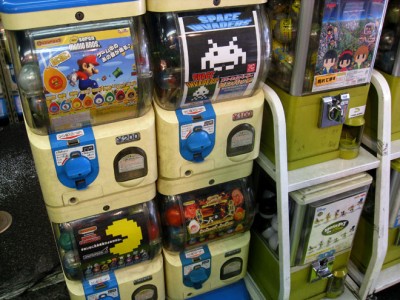 Of these 5 possibilities, continuing within a dungeon is the worst value and the least likely player purchase. Adding a creature to your stable or increasing the number of available creatures/friends are permanent upgrades to the player’s power. A stamina refill, while consumable, offers increased flexibility and the possibility of playing through several additional dungeons. Continuing within a dungeon, on the other hand, is a fleeting benefit that offers only a temporary boost to the current play session. A player will only continue if a rare creature (which they perceive to be worth at least $1) has already dropped and will absolutely be received upon completing the dungeon, or if they know that they can complete the dungeon quickly and safely. Otherwise, whatever killed them will probably just kill them again, and they’ll end up throwing good money after bad. The bulk of GungHo’s money is coming from players spending $5 per pop at the chance – not guarantee – of receiving a powerful creature to add to their arsenal. This mechanic is known as “gatcha,” after “gatchapon,” the random toys dispensed at convenience stores and video arcades from transparent plastic eggs. This technique is extremely popular in Japanese games, to the point that in May 2012 the Japanese Diet passed legislature banning a particularly nefarious variation known as “kompu gacha“. On the face of it, this is madness. When players spend real money in a game, they want to know they’ll be getting an actual advantage in return. Yet GungHo is earning tens of millions of dollars a month selling the possibility–not promise–of an advantage. But because of the game GungHo has constructed around that possibility, millions of players are willing to take that chance.
Of these 5 possibilities, continuing within a dungeon is the worst value and the least likely player purchase. Adding a creature to your stable or increasing the number of available creatures/friends are permanent upgrades to the player’s power. A stamina refill, while consumable, offers increased flexibility and the possibility of playing through several additional dungeons. Continuing within a dungeon, on the other hand, is a fleeting benefit that offers only a temporary boost to the current play session. A player will only continue if a rare creature (which they perceive to be worth at least $1) has already dropped and will absolutely be received upon completing the dungeon, or if they know that they can complete the dungeon quickly and safely. Otherwise, whatever killed them will probably just kill them again, and they’ll end up throwing good money after bad. The bulk of GungHo’s money is coming from players spending $5 per pop at the chance – not guarantee – of receiving a powerful creature to add to their arsenal. This mechanic is known as “gatcha,” after “gatchapon,” the random toys dispensed at convenience stores and video arcades from transparent plastic eggs. This technique is extremely popular in Japanese games, to the point that in May 2012 the Japanese Diet passed legislature banning a particularly nefarious variation known as “kompu gacha“. On the face of it, this is madness. When players spend real money in a game, they want to know they’ll be getting an actual advantage in return. Yet GungHo is earning tens of millions of dollars a month selling the possibility–not promise–of an advantage. But because of the game GungHo has constructed around that possibility, millions of players are willing to take that chance.
Balanced and Fair
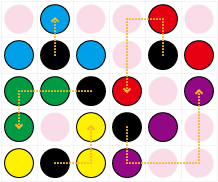 Ramin Shokrizade characterizes Puzzle & Dragons as “a money game disguised as a skill game.” This is incorrect and unfair. Puzzle & Dragons is a skill game that can be played as a money game. The core puzzle mechanic is more complex and interesting than the standard “match-3” of Bejeweled or Candy Crush Saga. Players can modify the layout of the entire playfield as they move their piece throughout the screen, setting up increasingly complex combos and chains. As a result, players are more engaged in the turn-to-turn action that makes up the game. Additionally, skilled players are able to quickly set up increasingly large combos, rewarding foresight and agility. Creatures in Puzzle & Dragons are carefully designed and balanced. A creature with low HP may have high Attack. A creature that is difficult to evolve may be easier to slot into your team once the evolution is complete. Some creatures may appear useless, only to reveal their full potential when used synergistically with another creature. Furthermore, “gatcha” and “drop” creatures are carefully balanced against each other such that no one side has an incontrovertible advantage. Similar (but still unique) creatures are available to both paying and non-paying players. Ultimately, any player can to build a team that matches their skill level and playstyle. Finally, Dungeons in Puzzle & Dragons are not fully randomized, but a series of set encounters against known enemies with consistent power and predictable, telegraphed attacks. This allows players to approach dungeons as larger metapuzzles, building a team capable of overcoming the specific challenges found within.
Ramin Shokrizade characterizes Puzzle & Dragons as “a money game disguised as a skill game.” This is incorrect and unfair. Puzzle & Dragons is a skill game that can be played as a money game. The core puzzle mechanic is more complex and interesting than the standard “match-3” of Bejeweled or Candy Crush Saga. Players can modify the layout of the entire playfield as they move their piece throughout the screen, setting up increasingly complex combos and chains. As a result, players are more engaged in the turn-to-turn action that makes up the game. Additionally, skilled players are able to quickly set up increasingly large combos, rewarding foresight and agility. Creatures in Puzzle & Dragons are carefully designed and balanced. A creature with low HP may have high Attack. A creature that is difficult to evolve may be easier to slot into your team once the evolution is complete. Some creatures may appear useless, only to reveal their full potential when used synergistically with another creature. Furthermore, “gatcha” and “drop” creatures are carefully balanced against each other such that no one side has an incontrovertible advantage. Similar (but still unique) creatures are available to both paying and non-paying players. Ultimately, any player can to build a team that matches their skill level and playstyle. Finally, Dungeons in Puzzle & Dragons are not fully randomized, but a series of set encounters against known enemies with consistent power and predictable, telegraphed attacks. This allows players to approach dungeons as larger metapuzzles, building a team capable of overcoming the specific challenges found within. 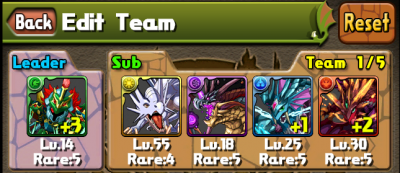 The complexity and balance of creatures, dungeons, team composition and puzzle mechanics results in a game where players can choose their own place on a spectrum of skill, luck, money, and time. A skilled player can play for hundreds of hours without spending a dime. A tight-knit community of hardcore players discusses strategies, and encourages new players to learn what the game has to offer. Meanwhile, a less skilled player can try to purchase more powerful creatures from the gatcha machine. Any “unfairness” comes from an impersonal random number generator, not from the underlying game mechanics.
The complexity and balance of creatures, dungeons, team composition and puzzle mechanics results in a game where players can choose their own place on a spectrum of skill, luck, money, and time. A skilled player can play for hundreds of hours without spending a dime. A tight-knit community of hardcore players discusses strategies, and encourages new players to learn what the game has to offer. Meanwhile, a less skilled player can try to purchase more powerful creatures from the gatcha machine. Any “unfairness” comes from an impersonal random number generator, not from the underlying game mechanics.
Constantly Changing
The world of Puzzle & Dragons is continually in flux. New dungeons are available just for a week, day, or even an hour. Special “collaboration” dungeons with popular games like Final Fantasy or Clash of Clans attract fans of those properties while giving Puzzle & Dragons players new content to explore. Time-limited events change the probability of receiving certain creatures or of unlocking certain content. New creatures, dungeons and game content are added frequently. Players are encouraged and rewarded to “check in” several times a day to see what’s happening. 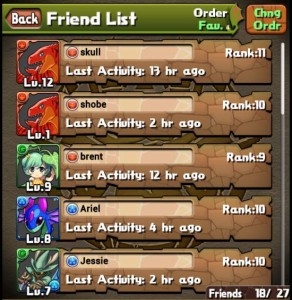 The greatest driver of continuous player engagement is the asynchronous co-op “Helper” system. When a team of creatures go into a dungeon, they can bring a “Helper” from their Friend List with them. A Helper grants powerful skills and bonuses to the rest of the team, and most dungeons after the first few hours cannot be completed without bringing a Helper along. However, once you’ve taken a Helper into a dungeon, the Helper is unavailable until that player logs in again. This encourages players to login several times a day, and to seek out other players of similar level and engagement. Players enjoy “bringing along” another player’s creature to help them overcome a particularly difficult dungeon. On the flip side, if a useful Helper doesn’t return for several days, most players will clear them out of their Friends list and look for someone more active.
The greatest driver of continuous player engagement is the asynchronous co-op “Helper” system. When a team of creatures go into a dungeon, they can bring a “Helper” from their Friend List with them. A Helper grants powerful skills and bonuses to the rest of the team, and most dungeons after the first few hours cannot be completed without bringing a Helper along. However, once you’ve taken a Helper into a dungeon, the Helper is unavailable until that player logs in again. This encourages players to login several times a day, and to seek out other players of similar level and engagement. Players enjoy “bringing along” another player’s creature to help them overcome a particularly difficult dungeon. On the flip side, if a useful Helper doesn’t return for several days, most players will clear them out of their Friends list and look for someone more active.
Surprisingly Generous
In addition to the constant addition of new content and special events, Puzzle & Dragons is constantly bombarding the player with free rewards. Special events increase the chance for exceptionally powerful creatures to drop from the gatcha machine, or for particularly desirable creatures to appear inside of dungeons. Most crucially, GungHo can’t seem to stop bombarding players the premium currency (“Magic Stones”) used for all in-game purchases. An average player will receive the equivalent of $20 USD /month in Magic Stones just from playing the game normally. This not only increases player satisfaction, it brings all players – paying and not – into the “premium” economy.
The Carrot or the Stick?
Let’s end with a cautionary tale from World of Warcraft. World of Warcraft introduced the concept of “Rest” to MMOs. Rested characters are ones that have not been played for a while; eager to get back in the game, they receive 200% XP for a few hours before returning to the default 100% XP. Players love Rest, and almost every MMO since World of Warcraft has adopted a similar system. But when Rest was first introduced, it was called something different: Fatigue. Players would begin their play session earning 100% XP, but after a few short hours become “Fatigued” and be penalized, receiving a mere 50% XP. Players hated it. Why were they being punished for playing the game they loved? Rest, Fatigue. Same system, different name. So what’s the difference? “Rest” rewards players for not playing, while “Fatigue” punishes players for playing too much. Players love being rewarded, and they hate being punished. The most profitable free-to-play game in the world has succeeded by focusing their economic model on player respect and positive reinforcement, not the overtly cruel timers and obvious withholding that usually defines the genre. So while the mechanics may be similar, the perception is night-and-day. Players can feel the difference, and that attitude makes them more likely to give money to the game. And that’s why GungHo’s laughing – and smiling, and sharing – all the way to the bank.



